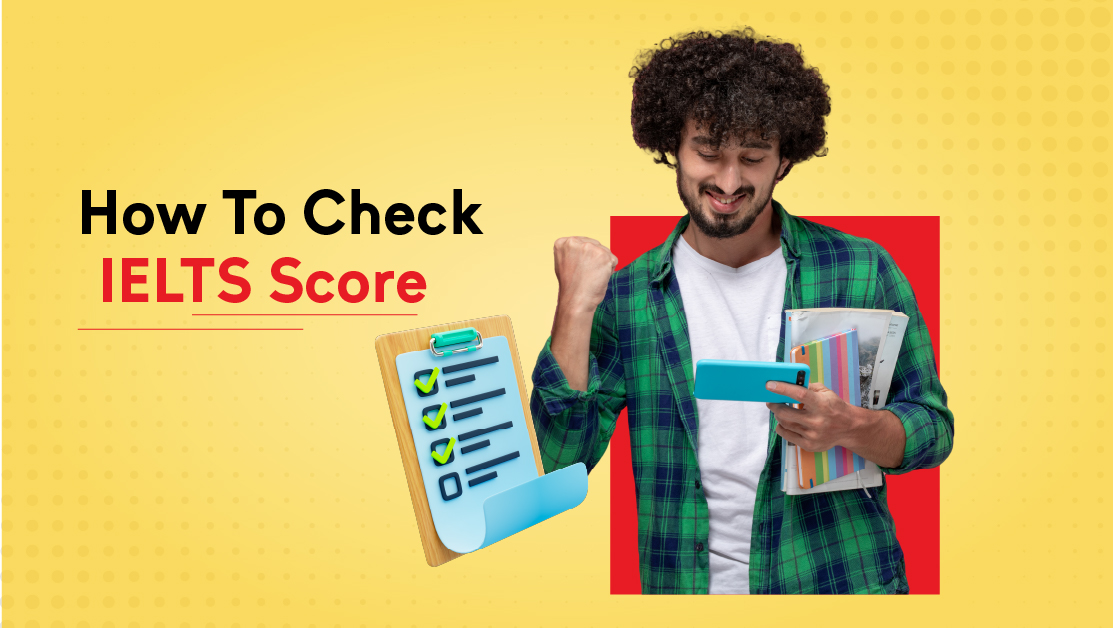
How To Check IELTS Score
In this article, we will focus on scoring, and what you need to know about how IELTS is scored.
After taking the IELTS exam, you will receive a score report and, on that report, you will have an overall score and a score for each of the four sections of the IELTS exam.
- Your overall score is just really your average score from the scores you receive in listening, reading, writing, and speaking. We will describe that a little more in detail later in this article.
- For now, just know that you will receive all of those types of the IELTS score after you take the IELTS exams and IELTS score will be reportedhalf-point increments from 1 to 9, band score: you may get a score of 7 or a score of 7.5 but there will not be other decimal points to your IELTS score. There will not be 6.75 or 6.25. Those don’t occur; it is in half-point increments.
IELTS scoring in detail – How IELTS is scored?
First of all, what is a band score?
The easiest way to think about the band score is to look at how the IELTS defines what each band score means.
- So, we could look starting with band 1. Getting a band 1 means a non-user of English. This person cannot understand English, cannot speak and write; this person has no skills in English.
- As you go through the bands up to 9, band 3 is very limited use of English, while band 7 is a good user of English, and 9 is an expert user of English.
- Along the way from 1 to 9, there is a different level of English at each step and each level has its own set of characteristics or defining qualities that define the person’s level.
How is the band score calculated?
Overall band score is just, as we said before, an average of your IELTS score from all four sections of the IELTS exam, so for example,
- if a student gets a 6.5 in reading, 5.5 in listening, 6 in writing, and a 7 in speaking, we would just add all of these up and divide by four. When you do that, you get 6.25.
- However, remember, IELTS scores are always in half-point increments, so this lucky student would have his/her IELTS score rounded up to the next to have a band score of 6.5.
Now, how our overall score is rounded?
Rounding scores
- If you average your four scores and the number ends in (0.25), it is going to round up to the nearest half-point.
- If your IELTS score ends in (0.75), you are very lucky because your IELTS score is going to up to the next band; a person who gets 6.75 will have his/her IELTS score rounded up to 7.
- Unfortunately, if your IELTS score, after it’s been averaged, ends in a (0.125) or lower than (0.25), it is going to round down. It is going to round down to the band score.
- So, 6.125 average of all four sections would end up being an overall band score of 6.
- For writing, you will find it a little different and a little more complex. Writing is scored using what is called a detailed rubric.
- The rubric is just that they use different categories to analyze your writing. Each category has things that they are looking for; they will see did you do this well or did you not do this well. If you did not, then they are going to move your IELTS score in that category down and if you did do it well, they are going to move your IELTS score in that category up.
Learn more about: how to register IELTS Exam in UAE 2022.
You can look at the rubric for writing, in general, we could describe the IELTS skills they are looking for in the following way; In general, the categories used to assess writing are:
- The first thing they look for in your writing is that you show coherence and cohesion which are all about how your ideas really stick together and make a logical sense.
- Coherence is all about how the ideas fit together; one idea leads to the next and it is very easy to follow what you are saying.
- Cohesion is about how you use words like pronouns or transition words like: for example, for instance, or things like that to hold your writing together.
- The lexical resource is a fancy way of saying that you have a really good vocabulary and you show your vocabulary knowledge in your writing.
- Grammatical range means that you can accurately use a variety of structures when you write.
- When we come to task achievement and task response, we will find them a little different. Basically, task achievement is for task 1 responses in the writing section and that just means that you have fulfilled all of the requirements for the task; you followed the directions carefully and did everything you wanted to do.
- Task response is very similar. It is for task 2 writing exercises and it means that you wrote a good academic formal essay rightly. Depending on these four categories they are judging your writing.
- Scoring speaking is very similar. They also use a detailed rubric. Like the writing, we have four categories.
They want fluency and coherence.
- Fluency means whether can speak well or not. Do you not have a lot of long pauses and your ideas easily flow together and you don’t come up with sentences and words a lot.
- Coherence means that your ideas stick together. It is just like the writing concept we just discussed. The lexical resource is the same as with writing; how well can you use vocabulary; how much vocabulary and actually how accurately do you use the words that you use.
- Grammatical range and accuracy again are about how much variety and how varied your grammar structures are and whether you use them correctly or whether you have a lot of mistakes.
- Pronunciation: basically, how it is easy to understand you, that you don’t have a lot of sounds that are not very natural sounding in English or that cause confusion. They are looking for individual sounds and stress patterns and sentences.
To summarize, the first point after taking your exam, you will receive the IELTS score report with your overall score and your section scores. Your overall score will just be your average score for the entire test and the IELTS score will be rounded up or down to the nearest half-point. Remember that they do scoring depending on what your average score is and what decimal point is at the end. Most universities colleges are looking for band scores ranging from 5.5 to 7.5 but you need to check with your institution to see what they require. Concerning reading and listening, follow the score table. 30 out of 40 will be a band 6 on General training for example. For writing and speaking, you just need to learn the rubrics well. You need to know what you need to be able to do for the band score you are trying to achieve. If you are trying to achieve a 7-band score in speaking and writing, go look at what is required for those and try to achieve those tasks. We will talk about those a lot in our articles coming up for each section of the exam. To get the band score you want, our practical training and preparing courses on Elmadrasah.com will definitely help you.
Be ready with our: Expert online private tutor.
How To Check IELTS Score Online?
Are you finding it difficult to check your IELTS score online?
We are going to show you the best way to check your IELTS score.
- The first thing we want to do is to go to (results.ieltsessentials.com).
- There you will see a screen that asks you for your first name, family name, passport number, and date of birth.
- It’s very important that the information you put in there is the same as when you registered for the exam on the website (my.ieltsessentials.com).
- Be careful that you didn’t make a mistake with your name, for example putting your family name in with your first name. If you don’t have a family name you must put in a hyphen.
- If you are still having problems, log in to my.ieltsessentials.com and check how you wrote your information.
- If you have lost your username and password, click on the links and you will be able to reset them.
- Please remember that your IELTS results will be ready for computer-based exams in 3 to 5 days and, for paper-based, on the 13th day after your test.
- Also, when you take the test, you are given a small piece of paper at your desk that shows you the information that you entered when you registered for the test. It also shows you your ID document number so you can refer to this when you check your IELTS score.
In the end, this article has showed you how to check the IELTS score and how the IELTS score is rounded and calculated. All you need to know about the IELTS score is on our website.
















